Horticultural Strathbungo
The villages of Strathbungo and Crossmyloof have a long reputation for their horticultural endeavours. Hugh MacDonald wrote in his “Rambles round Glasgow” (1854) :
“A considerable number of the humble edifices, however, have garden-plots attached to them for the cultivation of kitchen vegetables; and it is well known that both here [Crossmyloof] and at Strathbungo many of the handloom weavers are celebrated growers of tulips, pansies, dahlias, and other floricultural favourites. Florist clubs, also, exist among them, which meet regularly for the examination of choice flowers, and for discussing the best means of rearing them to perfection. We have had the pleasure, at various periods, of conversing with several of these bloom worshippers—for such, in truth, they are—and we must admit that we were fairly astounded at the multifarious charms which they could discover and point out in what seemed to our obtuse visual organs a simple tulip or pansy. We could not help, indeed, comparing ourselves, when in their company, to Wordsworth’s “Peter Bell,” of whom it was said,—
” A primrose by the river’s brim
A yellow primrose was to him,
And it was nothing more.”
What a different affair was a primrose or a pansy to our Crossmyloof friends! It was indeed “a great deal more” than it seemed to the uninitiated. There are some sharpsighted people who are said to see farther into a millstone than their neighbours. For the truth of the saying we shall not venture to vouch; but most assuredly, for seeing into the mysteries of a tulip or a dahlia, we shall back a Crossmyloof or Strabungo weaver against the united amateurs of Scotland.
After all, however, there is something very creditable to such individuals in their enthusiastic love of flowers. We know not, indeed, how a working man could spend his leisure hours more harmlessly or pleasantly, than in the cultivation of a little flower-plot. In towns such a privilege is beyond the reach of the operative ; but in suburban situations and rural villages, it is exceedingly gratifying to witness the manifestations of such a taste.”
Alexander Scott, speaking to the Glasgow Archaeological Society in 1884 , again made reference to the tradition, including “…William Neilson (aged 81), the last survivor resident in the village of the very old inhabitants of Strathbungo, and who in his earlier years was a noted local floriculturist.”
The Austin & McAslan Nursery
This tradition may have been related to the local nursery, Austin & McAslan, although it is hard to determine which came first. The nursery business was started by John McAslan in 1717 , , when he rented ground behind the old Hutcheson Hospital on Trongate, and latterly built a mansion and new nursery at The Hill, south of Dobbies Loan. A street through this area was later named McAslan Street, although it has now disappeared under modern Townhead. He was joined by his brother Duncan, and succeeded by his wife, and then Duncan’s son, another John.
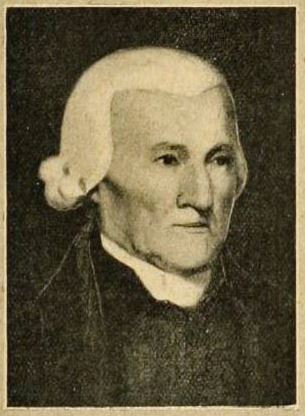
John McAslan, nephew of founder, partner 1759-1815
The foreman Robert Austin, of Milngavie, who trained in London, became a partner in 1782, and married into the family in 1786. The nursery moved to Little Govan in 1798.
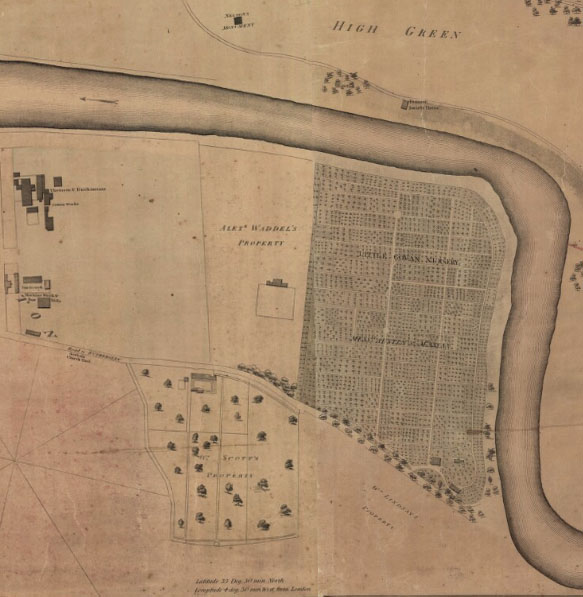
Peter Fleming 1807 Glasgow Map showing Austin & McAslan Little Govan Nursery, opposite Glasgow Green
In 1803 John McAslan retired, and his son Alexander partnered with Robert Austin, the name changing to Austin & McAslan. Robert’s younger brother James trained at Kew, before joining the firm.

Robert Austin, partner 1782-1830
Coplawhill site
In 1828 the nursery moved again, to Coplawhill, immediately to the north of Strathbungo village.
OS maps from the 1850s show a large nursery extending almost from Nithsdale Road (opposite the old Strathbungo Parish Church) to Albert Drive, and on the other side of Pollokshaws Road, to Butterbiggins and Langside Roads. The firm grew forest-trees, fruit-trees, shrubs, greenhouse plants and roses from Coplawhill. Robert Austin was noted for his promotion of the double scotch roses, then very popular.
According to Peter Boyd , ‘In about 1805, Robert Austin of Austin and McAslan, Glasgow nurserymen, obtained plants from the Perth nursery [of Messrs. Dickson and Brown] and, by about 1820, had raised about 100 new varieties of double Scots Roses. By the mid 1820s, Robert Austin had raised and offered for sale over 200 varieties. Similarly, London nurserymen (most of whom were Scots at that time) and others had obtained the Perth varieties and by the end of the 1820s it was reported that “some hundreds of new varieties have flowered from seedling plants in the Hammersmith [Lee] nursery, and will soon be found in the sale catalogues”.’
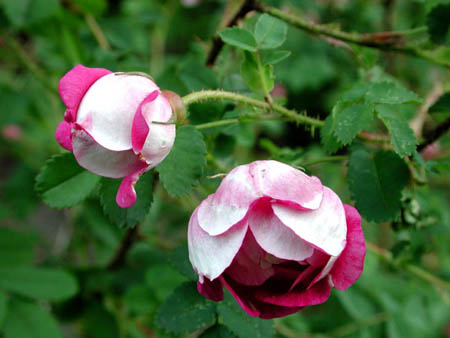
Scots Rose ‘Mary Queen of Scots’. Rose images © Peter Boyd, with permission.
The railways began to encroach on the site, and the site to the west of Pollokshaws Road was split by the railway, with a footbridge across it. The nursery left Coplawhill in 1868, moving to Titwood on the Pollok Estate (the site is now Hutcheson’s Grammar School and Fotheringay Road), and then to their Cathcart nursery in 1886. The Titwood Nursery closed in 1889 .
The Tramworks
The Coplawhill Tramworks was built on the larger northerly portion, initially with stables for horses, but later expanding over the entire site to become the hub of Glasgow’s electric tram network. The smaller site south of the railway became the Nursery Brickworks. It is now housing, but the former use lives on in the street name, Nursery Street.
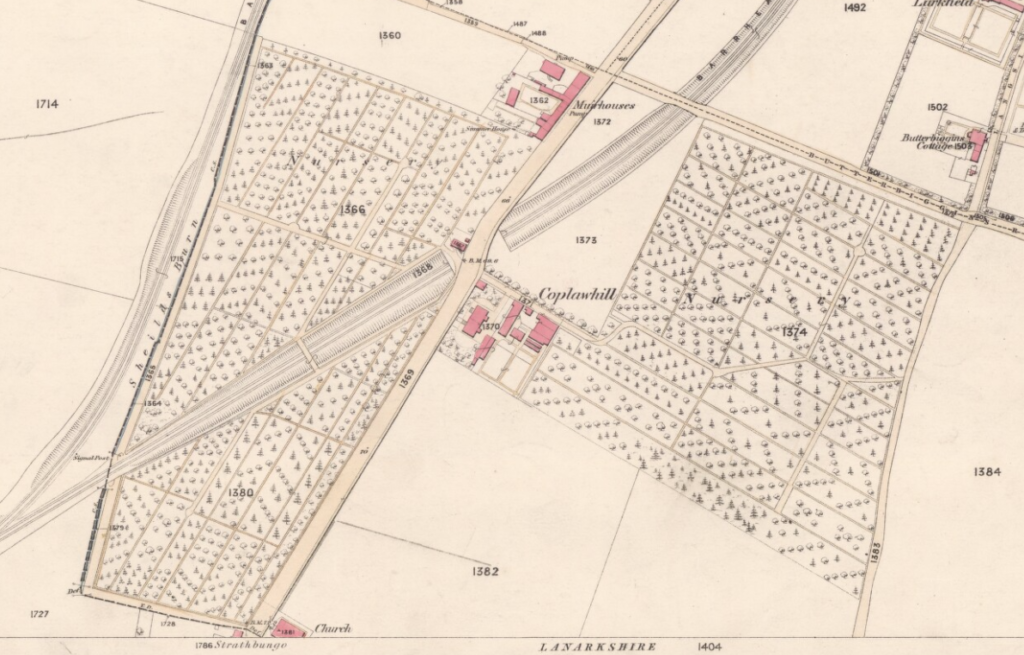
The Nursery, c 1858. Albert Road now runs between the Muirhouses (in pink) and the northern end of the nursery.

The same site in 1894. The tramworks, brickworks, Victoria Road, Albert Road, and several railway lines, are all new.

The tramworks expanded to eventually cover the entire plot. After closure in 1964 they were converted to Glasgow’s Transport Museum until it moved to Kelvinhall in 1987. A much reduced building became Tramway, and the Hidden Gardens opened in the new space behind it in 2003.
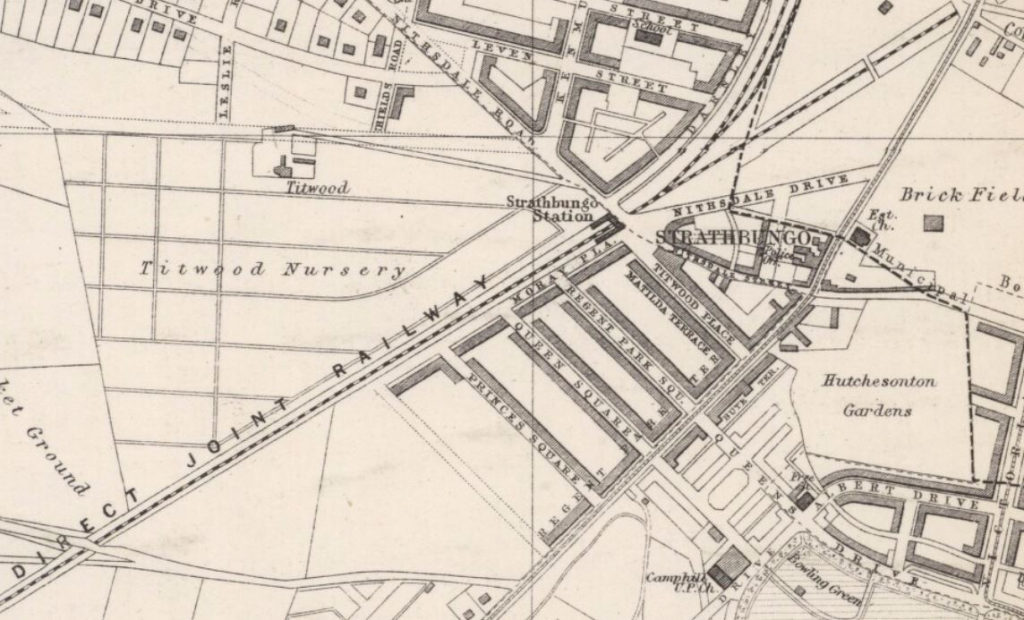
Map by John Bartholomew for the PO Directory of 1882, showing Titwood Nursery
The fate of Austin & McAslan
In 1888 the business was still in family hands in Hugh Austin, partnered since 1860 by James Hunter, who was succeeded by his son Alexander Neilston Hunter. A celebratory dinner was held in Glasgow in 1917 to mark the firm’s bicentennial .
The company continued in business in Glasgow until the 1960s when it moved to Edinburgh, then disappeared. Until it left Glasgow it was considered the oldest continuously trading company in the city. The company records are in the Glasgow University Archives.
The Hidden Gardens
With the redevelopment of the Tram Depot into Tramway and the Scottish Ballet building, it is fitting that the open space has returned to its original horticultural use, as the Hidden Gardens.
Founded by NVA public arts organisation in 2003, The Hidden Gardens is an award-winning unique public green space and community development organisation located in one of Scotland’s most diverse communities. Find out more at their website, or visit (entrance through Tramway on Albert Drive).
References
{3557955:DVZN7ZQ7};{3557955:DWE5F4CM};{3557955:8ITGIXNK};{3557955:JHIFIG58};{3557955:39SPP36C};{3557955:WVF9MSUA};{3557955:TZA6MBBP}
vancouver
asc
0
142
%7B%22status%22%3A%22success%22%2C%22updateneeded%22%3Afalse%2C%22instance%22%3A%22zotpress-53b2bc2d8345f566268b88b53f0dbd3a%22%2C%22meta%22%3A%7B%22request_last%22%3A0%2C%22request_next%22%3A0%2C%22used_cache%22%3Atrue%7D%2C%22data%22%3A%5B%7B%22key%22%3A%228ITGIXNK%22%2C%22library%22%3A%7B%22id%22%3A3557955%7D%2C%22meta%22%3A%7B%22parsedDate%22%3A%221917%22%2C%22numChildren%22%3A0%7D%2C%22bib%22%3A%22%3Cdiv%20class%3D%5C%22csl-bib-body%5C%22%20style%3D%5C%22line-height%3A%201.35%3B%20%5C%22%3E%5Cn%20%20%3Cdiv%20class%3D%5C%22csl-entry%5C%22%20style%3D%5C%22clear%3A%20left%3B%20%5C%22%3E%5Cn%20%20%20%20%3Cdiv%20class%3D%5C%22csl-left-margin%5C%22%20style%3D%5C%22float%3A%20left%3B%20padding-right%3A%200.5em%3B%20text-align%3A%20right%3B%20width%3A%201em%3B%5C%22%3E1.%3C%5C%2Fdiv%3E%3Cdiv%20class%3D%5C%22csl-right-inline%5C%22%20style%3D%5C%22margin%3A%200%20.4em%200%201.5em%3B%5C%22%3EMessrs.%20Austin%20and%20McAslan.%20The%20Gardeners%26%23x2019%3B%20chronicle%26%23x202F%3B%3Aa%20weekly%20illustrated%20journal%20of%20horticulture%20and%20allied%20subjects%20%5BInternet%5D.%201917%3B62%3A147%26%23x2013%3B8.%20Available%20from%3A%20%3Ca%20href%3D%27http%3A%5C%2F%5C%2Fwww.biodiversitylibrary.org%5C%2Fitem%5C%2F83846%23page%5C%2F707%27%3Ehttp%3A%5C%2F%5C%2Fwww.biodiversitylibrary.org%5C%2Fitem%5C%2F83846%23page%5C%2F707%3C%5C%2Fa%3E%3C%5C%2Fdiv%3E%5Cn%20%20%3C%5C%2Fdiv%3E%5Cn%3C%5C%2Fdiv%3E%22%2C%22data%22%3A%7B%22itemType%22%3A%22journalArticle%22%2C%22title%22%3A%22Messrs.%20Austin%20and%20McAslan%22%2C%22creators%22%3A%5B%5D%2C%22abstractNote%22%3A%22%22%2C%22date%22%3A%221917%22%2C%22language%22%3A%22%22%2C%22DOI%22%3A%22%22%2C%22ISSN%22%3A%22%22%2C%22url%22%3A%22http%3A%5C%2F%5C%2Fwww.biodiversitylibrary.org%5C%2Fitem%5C%2F83846%23page%5C%2F707%22%2C%22collections%22%3A%5B%22CAR6MXPM%22%5D%2C%22dateModified%22%3A%222016-12-13T23%3A24%3A32Z%22%7D%7D%2C%7B%22key%22%3A%22TZA6MBBP%22%2C%22library%22%3A%7B%22id%22%3A3557955%7D%2C%22meta%22%3A%7B%22parsedDate%22%3A%221917%22%2C%22numChildren%22%3A0%7D%2C%22bib%22%3A%22%3Cdiv%20class%3D%5C%22csl-bib-body%5C%22%20style%3D%5C%22line-height%3A%201.35%3B%20%5C%22%3E%5Cn%20%20%3Cdiv%20class%3D%5C%22csl-entry%5C%22%20style%3D%5C%22clear%3A%20left%3B%20%5C%22%3E%5Cn%20%20%20%20%3Cdiv%20class%3D%5C%22csl-left-margin%5C%22%20style%3D%5C%22float%3A%20left%3B%20padding-right%3A%200.5em%3B%20text-align%3A%20right%3B%20width%3A%201em%3B%5C%22%3E1.%3C%5C%2Fdiv%3E%3Cdiv%20class%3D%5C%22csl-right-inline%5C%22%20style%3D%5C%22margin%3A%200%20.4em%200%201.5em%3B%5C%22%3EHistoric%20Firm.%20The%20Gardeners%26%23x2019%3B%20chronicle%26%23x202F%3B%3Aa%20weekly%20illustrated%20journal%20of%20horticulture%20and%20allied%20subjects%20%5BInternet%5D.%201917%3B62%3A141%26%23x2013%3B2.%20Available%20from%3A%20%3Ca%20href%3D%27http%3A%5C%2F%5C%2Fwww.biodiversitylibrary.org%5C%2Fitem%5C%2F83846%23page%5C%2F695%27%3Ehttp%3A%5C%2F%5C%2Fwww.biodiversitylibrary.org%5C%2Fitem%5C%2F83846%23page%5C%2F695%3C%5C%2Fa%3E%3C%5C%2Fdiv%3E%5Cn%20%20%3C%5C%2Fdiv%3E%5Cn%3C%5C%2Fdiv%3E%22%2C%22data%22%3A%7B%22itemType%22%3A%22journalArticle%22%2C%22title%22%3A%22Historic%20Firm%22%2C%22creators%22%3A%5B%5D%2C%22abstractNote%22%3A%22%22%2C%22date%22%3A%221917%22%2C%22language%22%3A%22%22%2C%22DOI%22%3A%22%22%2C%22ISSN%22%3A%22%22%2C%22url%22%3A%22http%3A%5C%2F%5C%2Fwww.biodiversitylibrary.org%5C%2Fitem%5C%2F83846%23page%5C%2F695%22%2C%22collections%22%3A%5B%22CAR6MXPM%22%5D%2C%22dateModified%22%3A%222016-12-13T23%3A24%3A15Z%22%7D%7D%2C%7B%22key%22%3A%2239SPP36C%22%2C%22library%22%3A%7B%22id%22%3A3557955%7D%2C%22meta%22%3A%7B%22creatorSummary%22%3A%22Boyd%22%2C%22numChildren%22%3A1%7D%2C%22bib%22%3A%22%3Cdiv%20class%3D%5C%22csl-bib-body%5C%22%20style%3D%5C%22line-height%3A%201.35%3B%20%5C%22%3E%5Cn%20%20%3Cdiv%20class%3D%5C%22csl-entry%5C%22%20style%3D%5C%22clear%3A%20left%3B%20%5C%22%3E%5Cn%20%20%20%20%3Cdiv%20class%3D%5C%22csl-left-margin%5C%22%20style%3D%5C%22float%3A%20left%3B%20padding-right%3A%200.5em%3B%20text-align%3A%20right%3B%20width%3A%201em%3B%5C%22%3E1.%3C%5C%2Fdiv%3E%3Cdiv%20class%3D%5C%22csl-right-inline%5C%22%20style%3D%5C%22margin%3A%200%20.4em%200%201.5em%3B%5C%22%3EBoyd%20PDA.%20Scots%20Roses%20-%20past%20and%20present%20%5BInternet%5D.%20%5Bcited%202016%20Nov%2022%5D.%20Available%20from%3A%20%3Ca%20href%3D%27http%3A%5C%2F%5C%2Fwww.peterboyd.com%5C%2Frosapimp12.htm%27%3Ehttp%3A%5C%2F%5C%2Fwww.peterboyd.com%5C%2Frosapimp12.htm%3C%5C%2Fa%3E%3C%5C%2Fdiv%3E%5Cn%20%20%3C%5C%2Fdiv%3E%5Cn%3C%5C%2Fdiv%3E%22%2C%22data%22%3A%7B%22itemType%22%3A%22webpage%22%2C%22title%22%3A%22Scots%20Roses%20-%20past%20and%20present%22%2C%22creators%22%3A%5B%7B%22creatorType%22%3A%22author%22%2C%22firstName%22%3A%22Peter%20D.%20A.%22%2C%22lastName%22%3A%22Boyd%22%7D%5D%2C%22abstractNote%22%3A%22%22%2C%22date%22%3A%22%22%2C%22url%22%3A%22http%3A%5C%2F%5C%2Fwww.peterboyd.com%5C%2Frosapimp12.htm%22%2C%22language%22%3A%22%22%2C%22collections%22%3A%5B%22CAR6MXPM%22%5D%2C%22dateModified%22%3A%222016-11-26T13%3A42%3A39Z%22%7D%7D%2C%7B%22key%22%3A%22WVF9MSUA%22%2C%22library%22%3A%7B%22id%22%3A3557955%7D%2C%22meta%22%3A%7B%22numChildren%22%3A1%7D%2C%22bib%22%3A%22%3Cdiv%20class%3D%5C%22csl-bib-body%5C%22%20style%3D%5C%22line-height%3A%201.35%3B%20%5C%22%3E%5Cn%20%20%3Cdiv%20class%3D%5C%22csl-entry%5C%22%20style%3D%5C%22clear%3A%20left%3B%20%5C%22%3E%5Cn%20%20%20%20%3Cdiv%20class%3D%5C%22csl-left-margin%5C%22%20style%3D%5C%22float%3A%20left%3B%20padding-right%3A%200.5em%3B%20text-align%3A%20right%3B%20width%3A%201em%3B%5C%22%3E1.%3C%5C%2Fdiv%3E%3Cdiv%20class%3D%5C%22csl-right-inline%5C%22%20style%3D%5C%22margin%3A%200%20.4em%200%201.5em%3B%5C%22%3EAustin%20%26amp%3B%20McAslan%20%5BInternet%5D.%20%5Bcited%202016%20Nov%2022%5D.%20Available%20from%3A%20%3Ca%20href%3D%27http%3A%5C%2F%5C%2Fwww.glasgowwestaddress.co.uk%5C%2F1888_Book%5C%2FAustin_%26_McAslan.htm%27%3Ehttp%3A%5C%2F%5C%2Fwww.glasgowwestaddress.co.uk%5C%2F1888_Book%5C%2FAustin_%26_McAslan.htm%3C%5C%2Fa%3E%3C%5C%2Fdiv%3E%5Cn%20%20%3C%5C%2Fdiv%3E%5Cn%3C%5C%2Fdiv%3E%22%2C%22data%22%3A%7B%22itemType%22%3A%22webpage%22%2C%22title%22%3A%22Austin%20%26%20McAslan%22%2C%22creators%22%3A%5B%5D%2C%22abstractNote%22%3A%22%22%2C%22date%22%3A%22%22%2C%22url%22%3A%22http%3A%5C%2F%5C%2Fwww.glasgowwestaddress.co.uk%5C%2F1888_Book%5C%2FAustin_%26_McAslan.htm%22%2C%22language%22%3A%22%22%2C%22collections%22%3A%5B%22CAR6MXPM%22%5D%2C%22dateModified%22%3A%222016-11-22T21%3A39%3A07Z%22%7D%7D%2C%7B%22key%22%3A%22JHIFIG58%22%2C%22library%22%3A%7B%22id%22%3A3557955%7D%2C%22meta%22%3A%7B%22creatorSummary%22%3A%22Renwick%22%2C%22parsedDate%22%3A%221921%22%2C%22numChildren%22%3A0%7D%2C%22bib%22%3A%22%3Cdiv%20class%3D%5C%22csl-bib-body%5C%22%20style%3D%5C%22line-height%3A%201.35%3B%20%5C%22%3E%5Cn%20%20%3Cdiv%20class%3D%5C%22csl-entry%5C%22%20style%3D%5C%22clear%3A%20left%3B%20%5C%22%3E%5Cn%20%20%20%20%3Cdiv%20class%3D%5C%22csl-left-margin%5C%22%20style%3D%5C%22float%3A%20left%3B%20padding-right%3A%200.5em%3B%20text-align%3A%20right%3B%20width%3A%201em%3B%5C%22%3E1.%3C%5C%2Fdiv%3E%3Cdiv%20class%3D%5C%22csl-right-inline%5C%22%20style%3D%5C%22margin%3A%200%20.4em%200%201.5em%3B%5C%22%3ERenwick%20R.%20History%20of%20Glasgow%20%5BInternet%5D.%20Vol.%203.%20Glasgow%3A%20Maclehose%2C%20Jackson%20%26amp%3B%20Co%3B%201921.%20Available%20from%3A%20%3Ca%20href%3D%27https%3A%5C%2F%5C%2Farchive.org%5C%2Fstream%5C%2Fhistoryofglasgow03renwuoft%23page%5C%2F108%27%3Ehttps%3A%5C%2F%5C%2Farchive.org%5C%2Fstream%5C%2Fhistoryofglasgow03renwuoft%23page%5C%2F108%3C%5C%2Fa%3E%3C%5C%2Fdiv%3E%5Cn%20%20%3C%5C%2Fdiv%3E%5Cn%3C%5C%2Fdiv%3E%22%2C%22data%22%3A%7B%22itemType%22%3A%22book%22%2C%22title%22%3A%22History%20of%20Glasgow%22%2C%22creators%22%3A%5B%7B%22creatorType%22%3A%22author%22%2C%22firstName%22%3A%22Robert%22%2C%22lastName%22%3A%22Renwick%22%7D%5D%2C%22abstractNote%22%3A%22%22%2C%22date%22%3A%221921%22%2C%22language%22%3A%22%22%2C%22ISBN%22%3A%22%22%2C%22url%22%3A%22https%3A%5C%2F%5C%2Farchive.org%5C%2Fstream%5C%2Fhistoryofglasgow03renwuoft%23page%5C%2F108%22%2C%22collections%22%3A%5B%22CAR6MXPM%22%5D%2C%22dateModified%22%3A%222016-11-22T21%3A22%3A38Z%22%7D%7D%2C%7B%22key%22%3A%22DVZN7ZQ7%22%2C%22library%22%3A%7B%22id%22%3A3557955%7D%2C%22meta%22%3A%7B%22creatorSummary%22%3A%22MacDonald%22%2C%22parsedDate%22%3A%221860%22%2C%22numChildren%22%3A0%7D%2C%22bib%22%3A%22%3Cdiv%20class%3D%5C%22csl-bib-body%5C%22%20style%3D%5C%22line-height%3A%201.35%3B%20%5C%22%3E%5Cn%20%20%3Cdiv%20class%3D%5C%22csl-entry%5C%22%20style%3D%5C%22clear%3A%20left%3B%20%5C%22%3E%5Cn%20%20%20%20%3Cdiv%20class%3D%5C%22csl-left-margin%5C%22%20style%3D%5C%22float%3A%20left%3B%20padding-right%3A%200.5em%3B%20text-align%3A%20right%3B%20width%3A%201em%3B%5C%22%3E1.%3C%5C%2Fdiv%3E%3Cdiv%20class%3D%5C%22csl-right-inline%5C%22%20style%3D%5C%22margin%3A%200%20.4em%200%201.5em%3B%5C%22%3EMacDonald%20H.%20No.%20VII.-Pollokshaws%20%26amp%3B%20It%26%23x2019%3Bs%20Environs.%20In%3A%20Rambles%20Round%20Glasgow%3A%20Descriptive%2C%20Historical%2C%20and%20Traditional%20%5BInternet%5D.%202nd%20ed.%20John%20Cameron%3B%201860.%20p.%20117%26%23x2013%3B23.%20Available%20from%3A%20%3Ca%20href%3D%27https%3A%5C%2F%5C%2Farchive.org%5C%2Fdetails%5C%2Framblesroundgla00unkngoog%27%3Ehttps%3A%5C%2F%5C%2Farchive.org%5C%2Fdetails%5C%2Framblesroundgla00unkngoog%3C%5C%2Fa%3E%3C%5C%2Fdiv%3E%5Cn%20%20%3C%5C%2Fdiv%3E%5Cn%3C%5C%2Fdiv%3E%22%2C%22data%22%3A%7B%22itemType%22%3A%22bookSection%22%2C%22title%22%3A%22No.%20VII.-Pollokshaws%20%26%20It%27s%20Environs%22%2C%22creators%22%3A%5B%7B%22creatorType%22%3A%22author%22%2C%22firstName%22%3A%22Hugh%22%2C%22lastName%22%3A%22MacDonald%22%7D%5D%2C%22abstractNote%22%3A%22%22%2C%22bookTitle%22%3A%22Rambles%20Round%20Glasgow%3A%20Descriptive%2C%20Historical%2C%20and%20Traditional%22%2C%22date%22%3A%221860%22%2C%22language%22%3A%22%22%2C%22ISBN%22%3A%22%22%2C%22url%22%3A%22https%3A%5C%2F%5C%2Farchive.org%5C%2Fdetails%5C%2Framblesroundgla00unkngoog%22%2C%22collections%22%3A%5B%22CAR6MXPM%22%5D%2C%22dateModified%22%3A%222016-11-22T21%3A13%3A06Z%22%7D%7D%2C%7B%22key%22%3A%22DWE5F4CM%22%2C%22library%22%3A%7B%22id%22%3A3557955%7D%2C%22meta%22%3A%7B%22creatorSummary%22%3A%22Scott%22%2C%22parsedDate%22%3A%221886%22%2C%22numChildren%22%3A0%7D%2C%22bib%22%3A%22%3Cdiv%20class%3D%5C%22csl-bib-body%5C%22%20style%3D%5C%22line-height%3A%201.35%3B%20%5C%22%3E%5Cn%20%20%3Cdiv%20class%3D%5C%22csl-entry%5C%22%20style%3D%5C%22clear%3A%20left%3B%20%5C%22%3E%5Cn%20%20%20%20%3Cdiv%20class%3D%5C%22csl-left-margin%5C%22%20style%3D%5C%22float%3A%20left%3B%20padding-right%3A%200.5em%3B%20text-align%3A%20right%3B%20width%3A%201em%3B%5C%22%3E1.%3C%5C%2Fdiv%3E%3Cdiv%20class%3D%5C%22csl-right-inline%5C%22%20style%3D%5C%22margin%3A%200%20.4em%200%201.5em%3B%5C%22%3EScott%20AM.%20Notes%20on%20the%20Village%20of%20Strathbungo.%20Transactions%20of%20the%20Glasgow%20Archaeological%20Society%20%5BInternet%5D.%201886%3B1%282%29%3A130%26%23x2013%3B43.%20Available%20from%3A%20%3Ca%20href%3D%27http%3A%5C%2F%5C%2Fwww.jstor.org%5C%2Fstable%5C%2F43914696%27%3Ehttp%3A%5C%2F%5C%2Fwww.jstor.org%5C%2Fstable%5C%2F43914696%3C%5C%2Fa%3E%3C%5C%2Fdiv%3E%5Cn%20%20%3C%5C%2Fdiv%3E%5Cn%3C%5C%2Fdiv%3E%22%2C%22data%22%3A%7B%22itemType%22%3A%22journalArticle%22%2C%22title%22%3A%22Notes%20on%20the%20Village%20of%20Strathbungo%22%2C%22creators%22%3A%5B%7B%22creatorType%22%3A%22author%22%2C%22firstName%22%3A%22Alexander%20M.%22%2C%22lastName%22%3A%22Scott%22%7D%5D%2C%22abstractNote%22%3A%22%22%2C%22date%22%3A%221886%22%2C%22language%22%3A%22%22%2C%22DOI%22%3A%22%22%2C%22ISSN%22%3A%2223985755%2C%2023989548%22%2C%22url%22%3A%22http%3A%5C%2F%5C%2Fwww.jstor.org%5C%2Fstable%5C%2F43914696%22%2C%22collections%22%3A%5B%22CAR6MXPM%22%5D%2C%22dateModified%22%3A%222016-11-22T18%3A37%3A49Z%22%7D%7D%5D%7D
1.
Scott AM. Notes on the Village of Strathbungo. Transactions of the Glasgow Archaeological Society [Internet]. 1886;1(2):130–43. Available from:
http://www.jstor.org/stable/43914696
Like this:
Like Loading...









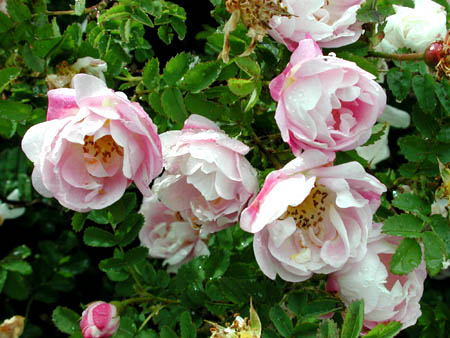
November 12, 2024 at 4:10 pm
Austin and McAslan was one of the seed businesses which formed the company Clan Seeds – the others being Drummond Brothers, Robert Inch, and Reid and Leys and traded in Edinburgh until the late 1980s and was latterly owned from circa 1964/5 by my father William Kirk McNair.
I have the original wooden wall mounted photographs of the directors 17017 to 1917 hanging in my house